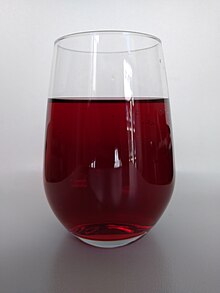Ribena
[2] In April 2018, in the United Kingdom, Ribena's longstanding recipe was changed by the addition of artificial sweeteners in response to the introduction of a sugary drinks tax by the UK government.
[3] Ribena was originally manufactured in England by the Bristol-based food and drink company HW Carter as a blackcurrant squash.
[5] During the Second World War, other fruits rich in vitamin C, like oranges, became very difficult to obtain in the United Kingdom, due to German submarine attacks on cargo ships.
[10] Through the years GSK and its predecessors developed many soft drink versions of Ribena but it retained an image as a "healthy food" in the UK and other Commonwealth countries.
[1][11] In 2001, a formulation of the diluted Ribena cordial, sold as Ribena Toothkind (and endorsed by the British Dental Association as being less damaging to teeth than other soft drinks), was judged by the United Kingdom Advertising Standards Authority to have been advertised in a misleading manner, and claims that the drink did not encourage tooth decay should be removed from the packaging.
[13] In 2004, Jenny Suo and a classmate in a New Zealand secondary school conducted a science experiment to determine the vitamin C levels of their favourite fruit drinks.
[11] Following further testing, in March 2007, the New Zealand Commerce Commission brought 15 charges in the Auckland District Court against GlaxoSmithKline under the Fair Trading Act.
[17] In January 2007, a study conducted by the Australian Consumers' Association for Choice magazine reported that blackcurrant juice (from concentrate) only constituted 5% of the Ribena fruit drink product.
